Tom Robinson - Interview
by John Clarkson
published: 10 / 4 / 2020
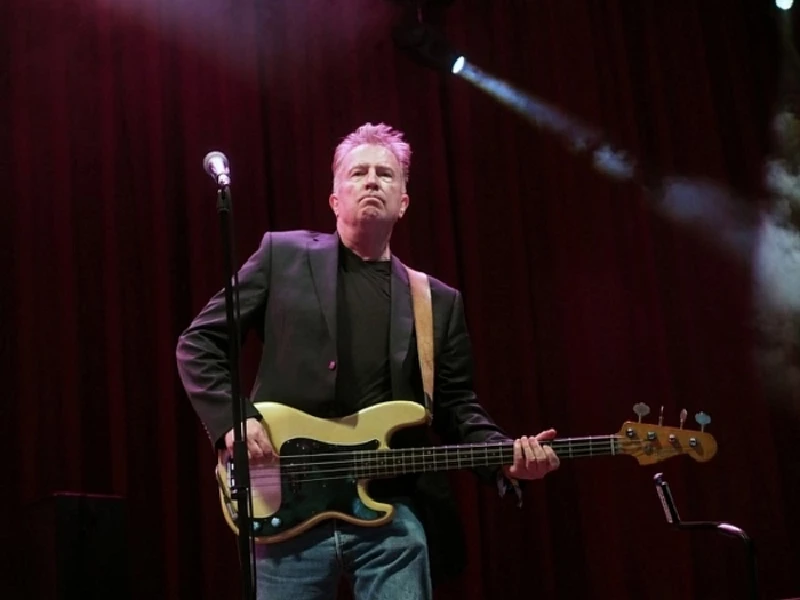
intro
Singer-songwriter and punk veteran Tom Robinson speaks to John Clarkson about his forthcoming 70th birthday and his past and present career.
One of the great protest singers of the 1970s, Tom Robinson will always be synonymous for his then group Tom Robinson Band's 1978 song, ‘Glad to Be Gay’, which is now seen to be Britain's leading gay anthem. Tom Robinson, who will be 70 in June, has come a long way from when, as a troubled sixteen-year old struggling with his sexuality, he made a suicide attempt and was sent to Finchden Hall, a therapeutic community for boys in Kent, to recuperate. Robinson spent six years at Finchden Hall, and, after attending a life-changing gig there by blues legend Alexis Korner, it set him on the path as a singer-songwriter. Robinson formed the political and socially conscious Tom Robinson Band in 1976 after witnessing an early Sex Pistols gig. The group, which featured Robinson on vocals and bass and his lifelong friend Danny Kustow who died aged 63 last year on guitar, had early success with their first single '2-4-6-8 Motorway', which reached no. 5 in the UK charts in 1977. 'Rising Free', an EP which included 'Glad to Be Gay' and live favourite 'Martin' about two inseparable tearaway brothers, peaked at no. 18 the following year, and their 1978 debut album 'Power in the Darkness' - now seen as one of the definitive punk albums of the 1970s - was both critically well-received and got to no. 4 in the album charts. Their early success was, however, short-lived, and, after a second album 'TRB Two' failed, they broke up four months after its release in July 1979. Robinson eventually started a solo career, and had further success in the 1980s with his no. 6 single 'War Baby' and 1984 album 'Hope and Glory'. Other albums such as 'Still Loving You' (1986), Living in a Boom Time’ (1992) and ‘Having It Both Ways’ (1996) were less commercially successful but remain much under-rated. With his musical career in decline, Tom Robinson, who had married and had children, wanting to spend more time with his family, began a new career on radio. Since its inception in 2002, Robinson has been a regular DJ and presenter on BBC 6 Music. He returned to music in 2015 with 'Only the Now', his seventh solo album and first release in nineteen years, playing an extensive UK tour to promote it. He toured again in 2018 to celebrate the 40th Anniversary of 'Power in the Darkness'. In our third interview with him, Pennyblackmusic spoke to Tom Robinson, a week before the UK lockdown, nominally about a tour in May for his 70th birthday. While Robinson was hoping then that the tour might still go ahead, it has been now postponed by a year until May 2021. Robinson proved to be in thoughtful and reflective mood, and the interview went beyond that, a reflection instead on the Tom Robinson of the past and present. PB: Since you last toured in 2018 you have lost Danny Kustow. You have said that losing Danny “brought home the importance for all of us of living in the moment and seizing our chances while we have them.” Is that your main reason for doing this tour? TOM ROBINSON: It is both that and turning 70. It is a major landmark. You can’t kid yourself that you are in late middle age anymore. You are definitely into old age when you turn seventy (Laughs), and it is a major life change to mark that.You have to, of course, seize the moment, and Danny was always putting everything off until tomorrow and never did do that. PB: How much did you have to do with Danny since the Tom Robinson Band split up and in recent years? TR: We remained in social contact. We met at Finchden Hall, a therapeutic community for disturbed adolescents. We were both fairly difficult to get on with, so the Tom Robinson Band had the seeds of self-destruction built into it (Laughs). We, however, had Alexis Korner in common as a mentor. Alexis had been a former student at Finchden, and came back there to play a gig for the boys there. We bonded over that. That was also the first night that Danny was in there. Danny also later dated Alexis’s daughter briefly. Alexis was a legend, and he went on to mentor us both individually, and then when we came together as a band he was also supportive. PB: You first started touring again in 2015 to promote the ‘Only the Now’ album and for the first time in almost twenty years. TR: Yeah, we had done one off shows, but we hadn’t done proper tours since I started at 6 Music. That coincided with another life change. I had just got past my fiftieth birthday, and 6 Music was just starting up and offered me a job, so I seized the chance to sleep in my own bed and see my kids growing up. PB: How easy has it been touring again? TR: At first it was quite physically demanding. It took me aback just remembering how physical it is playing the bass guitar, and especially on the TRB songs which were breakneck paced (Laughs) It was a shock to the system aged 65+ playing songs which I had originally written and performed in my early twenties. It was good though to find out that I still had the vigour to do it. PB: Do you have to do a lot to maintain personal fitness? TR: I never did back in the day, so not that much. The actual act of doing the tour gets you pretty fit. I have got one of those Fitbit step counter things, and when I come off stage there is 12,000 steps on there. It is so energetic, but there is no point doing it unless you are going to do it full on. There is no off switch for that particular material. You have just got to go for it. PB: You have done lots of work for various charities and organisations such as CALM, Rock Against Racism and Amnesty as well as various LBGT groups. What are your main charities these days? TR: I support Shelter because the homeless crisis is literally under all our feet. You are literally walking over people when you are out who are destitute. It is absolutely Dickensian and a scandal that we should be one of the ten richest nations on Earth, and that some of our citizens should be in those circumstances and the subject of horrific neglect. My other biggest concern is CALM because mental health is a growing issue, particularly for young people with suicide being the biggest killer of men under 45, which is a staggering statistic, and because I have battled depression all my life and a couple of times I attempted to take my own life. I would have missed out on so much brilliant stuff if I had succeeded. I had no idea what was waiting for me in the future, so it is really important that I do my best to spread that message to people who are going through the same stuff now. PB: Your life would make the subject of a wonderful biography or autobiography. TR: Well, that is the plan. My main objective for this year after the tour and the 70th celebrations are over is to sit down and actually write an autobiography, or -shall we say? - a memoir. I am calling it a memoir because my memory is so shit these days (Laughs). I have been getting interviews for it off some of my friends, who do remember stuff. I have got a friend who goes and interviews them and gets material because they wouldn’t say it to me (Laughs). I have got quite a lot of material gathered up for it, but I do have to sit down and get on with writing it. PB: Out of all your achievements- and there have been many - you will always perhaps be best known for being the bloke who wrote ‘Glad to Be Gay’. Do you see that as both a blessing and a curse? TR: No. It’s great. What a brilliant thing to be known for. It was such a blight on my life during my first sixteen years on the planet, so being known as somebody that tried to turn it on its head all these years on is wonderful. Each generation of queer kids that comes through has to reinvent the world for themselves. If you grow up in an ethnic minority within in a society. at least you have got your parents to give you some kind of arming for the struggle ahead. If you grow up with some kind of special needs, you parents will again understand and support you on that, but if you grow up queer it is quite often contrary to the wishes of your parents or the outlook of your parents because you tend to grow up in most cases with heterosexual parents. So, you have to find you community, your feet, your identity and each time it has to be redone. Each new generation has to discover it themselves and to come through that problem. We have made unimaginable strides with gay rights. I could not have conceived back in the 1960s or the 1970s or even in the ’80s that we have come to where we are now with gay marriage and LBGT rights, but is has still got a long way to go yet. Today ‘gay’ is still an insult in schools. ‘Oh, that is so gay’ means that something is shit or second rate. It is still less than easy for the younger generations of kids, so I think that the more we can do to put normalise it the better. That said, you can’t have LBGT rights in separation of civil rights or men and women having equal rights in society, which we are still a fucking long way away from. Just see the equal pay rights which are still going on. It is astonishing that in 2020 that is still in question. I find it depressing that TRB and our colleagues stood for a broadly liberal agenda for equality and we are still not there yet. We were standing up against racism, standing up against sexism and standing up for civil rights as well as LBGT rights. LBGT rights have, thank God, improved, but I think that we have got an awfully long way to go especially in equality for the sexes and equality for people from ethnic backgrounds. PB: Your musical career went through two peaks with ‘Power in the Darkness’ and ‘Hope and Glory’ and the singles and EPs -'2-4-6-8 Motorway', 'Rising Free', 'War Baby' and 'Listen to the Radio' - that came alongside them.‘Still Loving You’ and ‘Living in a Boom Town’ -to give two examples- are both fantastic albums but are less well known. Is that a source of disappointment to you? TR: No. You’re not entitled to success. I don’t think anybody gives you the god given right to an audience and when you get one it is a bonus. The key thing is that you have got to do the best work that you can and then whether it gets recognised or not is just in the lap of accidents of media and accidents of geography. ‘Still Loving You’, for instance, was a hit in Italy but in Italy they don’t know ‘War Baby’ at all. I also did well with some of my other songs that weren't hits here in Spain and Holland in particular, so geographically when you tour different songs have a different weight and resonance with the audience. I am blessed to have a strong and versatile band, who are able to play the songs from the different eras and make sense of my back catalogue. PB: It is not always remembered but you wrote various songs with Elton John for a while after the TRB ended. TR: He saved my life literally. It kept the mortgage paid with the publishers' rights from those songs with Elton. I think we wrote three published songs and one which wasn’t published but was a hit in France with different lyrics. We knew each other reasonably closely for about three or four years in the late ‘70s and early ‘80s. We have always got on well, and he has never treated me with anything other than love and affection. Bless him! PB: ‘Martin’ tells the story of two working class brothers. What inspired that song? Was it based on real people? TR: It was based on real people that I encountered when I went to Finchden Manor. I went there aged sixteen after my first suicide attempt and a nervous breakdown. It was a last chance saloon, and I stayed there for six years. It was a secluded community run along eccentric lines by an ex-public school headmaster in a Jacobean manor in the wilds of Kent, and it absolutely saved my life. Some of the boys that went in there as I did through the mental health services, but others had also come there through the Criminal Justice System, so we were rubbing shoulders with boys who otherwise would have been in borstal as well as boys who otherwise would have been in Broadmoor. It meant for the first time in my life that some of my friends were from very rough, very violent backgrounds, but the nature of the place was that it disarmed people. It didn’t enquire too much into people’s pasts. It was just concerned with the sort of person that you were now and it was a communal life, so it was more bothered about if this person was going to do the washing up so that we could all have lunch, rather than whether they were guilty of taking and driving away motor vehicles in their early teens. Some hair raising stories used to be told round the dinner table, and both Danny and I knew some real tearaways, and some of those stories very much stuck with me. So, when I was writing ‘Martin’ I drew on those. Although I was a relatively timid middle class boy from a secluded background in a Quaker boarding school and it wasn’t my personal experience, I did have a very close friend called Martin who was like a brother to me who had come from that world. So, when I was putting together this story of brotherly life about that background, that is how it developed. The background for that song comes from people that I knew rather than my own experiences. PB: At the age of almost 70 how do you feel looking back on the young Tom as he was just coming to fame in his mid and late twenties? TR: I want to reach out to him and say to him, “Don’t take it so seriously. For God’s sake, it is only rock and roll. You are going to be alright. Relax! You don’t have to try so fucking hard." I was so empty inside, so without worth which is the basis of depression, and as a lifelong depressive that is something that you always have to battle. I was labouring under the misapprehension that if only I could become famous enough, and have enough people come to my concerts and buy my records, and love me on stage, then that would make the emptiness go away and validate me and make me an okay person. It was only later in the life and in my mid-thirties that I finally met the person that I wanted to spend the rest of my life with, who turned out surprisingly to be a woman, that things went into perspective. It’s only music and it’s only a career. If the music doesn’t work out, you can do something else. It doesn’t invalidate you because your last record didn’t get into the Top 50. That is what I would try and say to him. We are all looking for that person who is going to love us. We have that preconception of who that person who is going to be the love of our life is. We can waste a lot of time looking for an ideal stereotype in our mind, thinking that it is going to be this kind of person or that kind of person and not be open enough to see that that kind of person might be there all the time. That was the strange thing for me. I thought that I was looking for the man of my dreams and I had no idea that it was going to be a woman. Thank God, I was able to recognise that person when I met them. The first step that I needed to take before that could happen was to love myself, before I could then find the person that I could then love as my life partner. You really do have to love yourself first, not in a self-regarding way, but you have got to cherish yourself and look after yourself and be kind to yourself. That means being kind to other people as well because the people who are the most critical of others, who are constantly carping about others generally have a really low sense of self-worth and take it out on other people I think if you can forgive other people and allow them to be human you can forgive yourself and allow yourself to be human too. PB: You have got a new live album out ‘Power in the Now’ coming out in May which was recorded at the 100 Club. TR: It features the last performance by Danny at the 100 Club. He came and got up with the band one last time in 2017 and did ‘2-4-6-8 Motorway’, and luckily we caught the recording. There is also a video of it, so we have Danny Kustow’s last performance of ‘2-4-6-8 Motorway’ on that album but the rest of that album was recorded at the Sage in Gateshead. It is just a particularly good set of live recordings. It is a recording of songs from ‘Only the Now’ because over the couple of years we toured those songs they developed and grew in the way in which bands always complain that they get to know the songs much better after they have made the album. They are enhanced versions of those songs, turbo-charged in some cases, and there are also songs like ‘Listen to the Radio’ and ‘War Baby’ on there as well, plus this very special version of ‘2-4-6-8’ which is seven minutes long with Danny jamming on it. PB: Final question. Are there liable to be more studio recordings? TR: The honest answer is I am not sure if the world is waiting for more music from Tom Robinson at this point. I think some parts, perhaps a very few parts of the world might be interested in a memoir from Tom Robinson. I think that they would find that more interesting than another song about a perceived injustice or crisis. I don’t think the world needs another ‘War Baby’ or ‘Power in the Darkness’ at this point. TS Eliot said in ‘Four Quartets’ “ Last season's fruit is eaten/And the fullfed beast shall kick the empty pail/For last year's words belong to last year's language/And next year's words await another voice,” and I think that you are more likely to get those songs from Stormzy than you are from me. PB: Thank you.
Band Links:-
http://www.tomrobinson.com/https://www.facebook.com/tomrobinsonmusic
https://www.twitter.com/gladtobegay
Picture Gallery:-
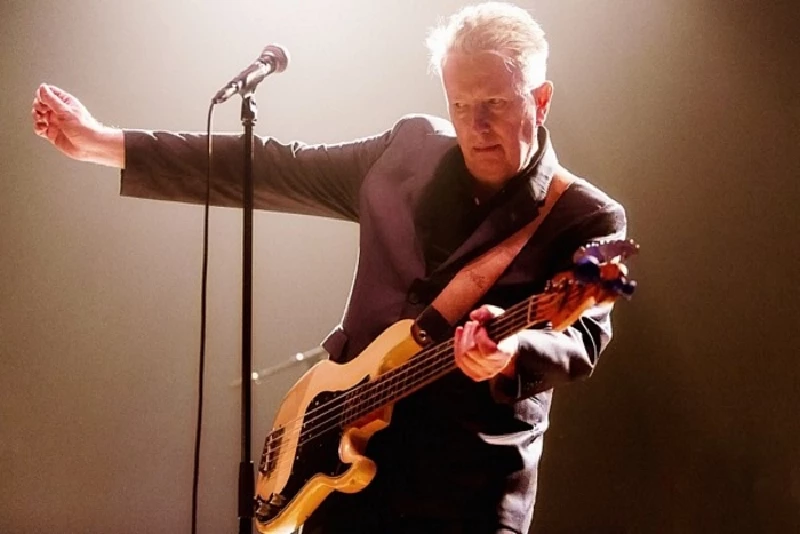
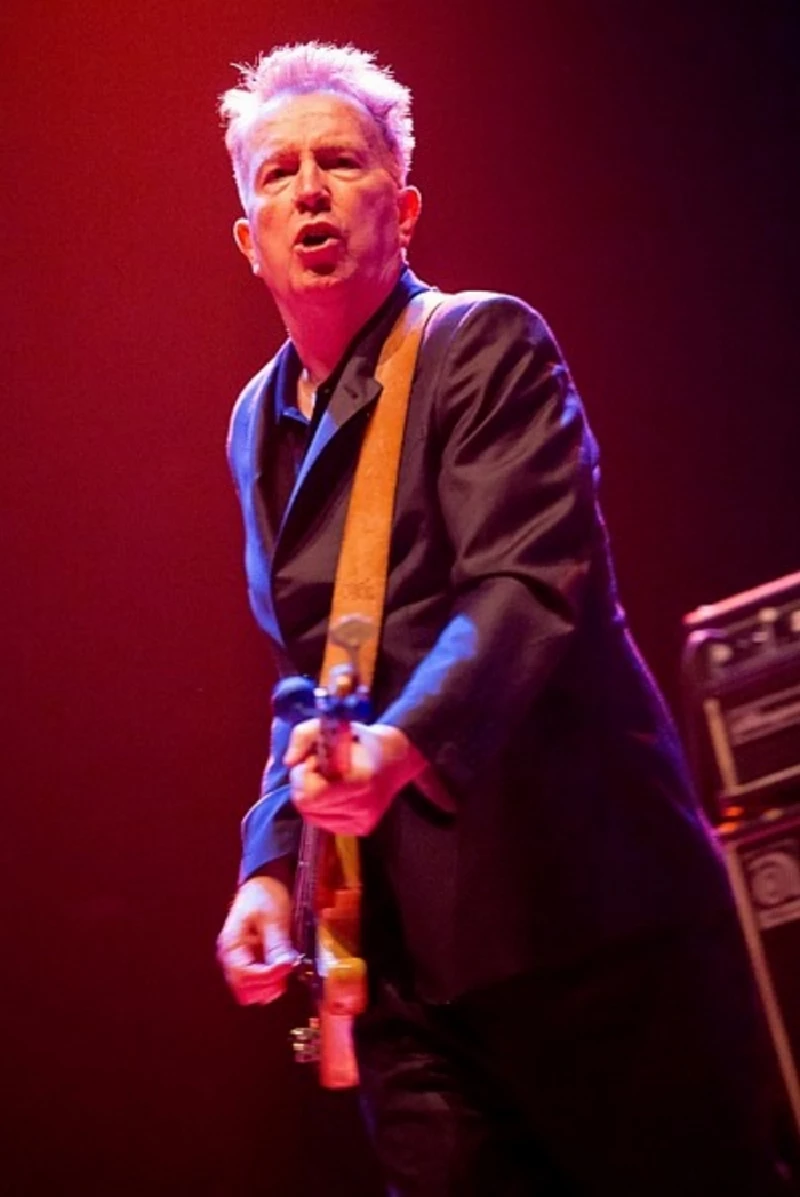
interviews |
|
Interview (2018) |

|
| Singer-songwriter and political activist Tom Robinson speaks to John Clarkson about the Tom Robinson Band's debut 1978 album 'Power in the Darkness', with which he is currently touring the UK on a 40th Anniversary tour. |
| Interview (2015) |
live reviews |
|
Queens Hall, Edinburgh, 6/11/2015 |

|
| John Clarkson watches protest musician and singer-songwriter Tom Robinson play an impressive show at the Queen's Hall in Edinburgh on his first tour in almost twenty years to promote his album 'Only the Now' |
photography |
|
Photoscapes (2018) |
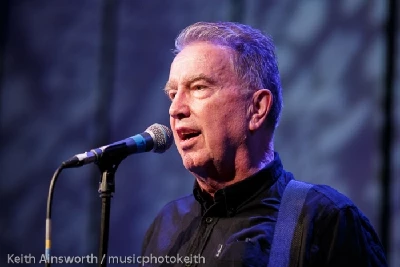
|
| Keith Ainsworth photographs Tom Robinson at a show in in Liverpool to celebrate the 40th Anniversary of his former group the Tom Robinson Band's debut album ‘Power in the Darkness’. |
soundcloud
reviews |
|
Only the Now (2015) |
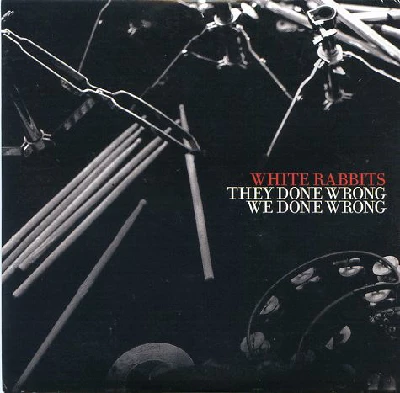
|
| Only partially successful comeback album from influential 70's singer-songwriter and protest musician, Tom Robinson |
most viewed articles
current edition
Peter Doherty - Blackheath Halls, Blackheath and Palace Halls, Watford, 18/3/2025 and 21/3/2025Armory Show - Interview with Richard Jobson
Liz Mitchell - Interview
Lauren Mayberry - Photoscapes
Deb Googe and Cara Tivey - Interview
Max Bianco and the BlueHearts - Troubadour, London, 29/3/2025
Sukie Smith - Interview
Maarten Schiethart - Vinyl Stories
Clive Langer - Interview
Kim Wilde - Photoscapes
previous editions
Heavenly - P.U.N.K. Girl EPBoomtown Rats - Ten Songs That Made Me Love....
Trudie Myerscough-Harris - Interview
Doris Brendel - Interview
Beautiful South - Ten Songs That Made Me Love...
Kay Russell - Interview with Kay Russell
Dwina Gibb - Interview
Pulp - Ten Songs That Made Me Love...
Sound - Interview with Bi Marshall Part 1
Jay Reatard - Interview
most viewed reviews
current edition
Davey Woodward - Mumbo in the JumboNigel Stonier - Wolf Notes
Wings - Venus and Mars
Only Child - Holy Ghosts
Kate Daisy Grant and Nick Pynn - Songs For The Trees
Neil Campbell - The Turnaround
Philip Jeays - Victoria
Darkness - Dreams On Toast
Suzanne Vega - Flying With Angels
Charles Ellsworth - Cosmic Cannon Fodder
related articles |
|
Tom Robinson: Photography (2018 |

|
| Keith Ainsworth photographs Tom Robinson at a show in in Liverpool to celebrate the 40th Anniversary of his former group the Tom Robinson Band's debut album ‘Power in the Darkness’. |
Pennyblackmusic Regular Contributors
Adrian Janes
Amanda J. Window
Andrew Twambley
Anthony Dhanendran
Benjamin Howarth
Cila Warncke
Daniel Cressey
Darren Aston
Dastardly
Dave Goodwin
Denzil Watson
Dominic B. Simpson
Eoghan Lyng
Fiona Hutchings
Harry Sherriff
Helen Tipping
Jamie Rowland
John Clarkson
Julie Cruickshank
Kimberly Bright
Lisa Torem
Maarten Schiethart